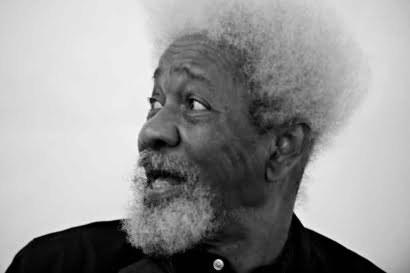
Wole Soyinka
- Nigeria, USA
- Zu Gast beim ilb: 2007, 2015
Wole Soyinka was born in Abeokuta, western Nigeria, in 1934. Following Literature and Drama Studies in Nigeria (Ibadan) and England (Leeds) he worked at the London Royal Court Theatre as an actor and dramatic advisor, where he also wrote his first plays. In 1960 he returned to Nigeria, where he undertook further drama studies, founded two acting troupes, directed two literary journals and taught at various universities. In 1967 he was accused of supporting the Biafran independence movement and was imprisoned without trial. The poetry collections »Poems from Prison« (1969) and his first autobiographical work »The Man Died« (1972) are concerned with the period that followed. Two years and four months later, he was freed in part owing to international protests. Since then he has been in exile twice, staying in Europe, USA and Ghana, with appointments as visiting professor in a number of universities. He also served as President of the International Theatre Institute in Paris, and later was the Woodruff Professor of Humanities at Emory University, Atlanta. During this period, in 1997 he was tried in absentia for high treason.
Ever since his early plays Soyinka has borne witness to the development of modern Africa and at the same time shaped his own vision of the human condition. In doing so he has positioned himself against uncritical embrace and romanticization of pre-colonial values and instead advocates a self-assured and creative advancement of African traditions. In his often satirical and ironic work, and with a passionate and challenging flow, Soyinka champions pluralism, democracy and social and political equality for Africa. The metaphorically rich and poetic myths of Yoruba are merged with those of Europe, combining Yoruba idioms of expression with the European and fusing literature with a political history of ideas.
In 1986 Soyinka was both the first black and the first African writer to win the Nobel Prize for Literature. In his later works – including essays and several autobiographical novels – he also focuses on global problems. In the BBC Reith Lecture series, published as »Climate of Fear« (2004) he confirms the political responsibility of citizens worldwide and condemns the major world religions as the most dangerous powers of the twenty-first century.
Soyinka has received multiple distinctions both in his native country and internationally. He has been awarded honorary doctorates by several universities – among them Leeds, Emory, Yale, Harvard, Montpellier, Toronto and Bayreuth – and is member of British, African, French and German literary associations, Commander of the Order of the Italian Republic and honorary citizen of New Orleans, Houston and Montpellier. Recently, in an article for »The Guardian«, he spoke out against the manipulation of the Nigerian elections in A pr il 2007. The author divides his time between Nigeria and the United States where he is currently a Senior Fellow of the Black Mountain Institute, University of Nevada, Las Vegas, and Non-Resident Fellow of the DuBois Institute, Harvard University. He has also resumed his position at the Obafemi Awolowo University, Ile-Ife, Nigeria, as Emeritus Professor in Comparative Literature.
© internationales literaturfestival berlin
A Dance of the Forests
Oxford University Press
London u.a., 1963
Idanre and Other Poems
Methuen
London, 1967
Kongi’s Harvest
Oxford University Press
London u.a., 1967
The Trials of Brother Jero
Oxford University Press
Nairobi u.a., 1969
Poems from Prison
Collings
London, 1969
Madmen and Specialists
Methuen
London, 1971
A Shuttle in the Crypt
Methuen
London, 1972
Der Löwe und die Perle
Volk und Welt
Berlin, 1973
[Ü: Helmut Heinrich]
Death and the King’s Horseman
Methuen
London, 1975
Ogun Abibiman
Collings
London, 1976
Myth, Literature and the African World
Cambridge University Press
Cambridge, 1976
Die Plage der tollwütigen Hunde
Walter
Olten, 1979
[Ü: Wolfgang Strauss]
Die Ausleger
Walter
Olten, 1983
[Ü: Inge Uffelmann]
A Play of Giants
Methuen
London, 1984
Requiem for a Futurologist
Collings
London, 1985
Aké
Ammann
Zürich, 1986
[Ü: Inge Uffelmann]
Der Mann ist tot. Aufzeichnungen aus dem Gefängnis
Ammann
Zürich, 1987
[Ü: Ulrich Enzensberger, Melanie Walz]
Stücke
Henschel
Berlin, 1987
[Ü: Joachim Fiebach]
Art, Dialoge and Outrage. Essays on Literature and Culture
New Horn Press
Ibadan, 1988
Die Strasse
Fischer
Frankfurt/Main, 1988
[Ü: Olga und Erich Fetter]
Diese Vergangenheit muss sich ihrer Gegenwart stellen. Eine Rede
Ammann
Zürich, 1988
[Ü: Inge Uffelmann]
Mandela’s Earth and Other Poems
Methuen
London, 1989
From Zia, With Love
Methuen
London, 1992
Orisha Liberates the Mind: Wole Soyinka in Conversation with Ulli Beier on Yoruba Religion
Iwalewa
Bayreuth, 1992
Ìsarà. Eine Reise rund um den Vater
Ammann
Zürich, 1994
[Ü: Inge Uffelmann]
The Beatification of Area Boy: A Lagosian Kaleidoscope
Methuen
London, 1995
The Open Sore of a Continent: A Personal Narrative of the Nigerian Crisis
Oxford University Press
New York u.a., 1996
Ibadan. Streunerjahre
Ammann
Zürich, 1998
[Ü: Irmgard Hölscher, Gerd Meuer, Ilse Strasmann]
Early Poems
Oxford University Press
Oxford/New York, 1998
Die Last des Erinnerns. Was Europa Afrika schuldet
Patmos
Düsseldorf, 2001
[Ü: Gerd Meuer]
King Baabu
Methuen
London, 2002
Samarkand und andere Märkte
Ammann
Zürich, 2004
[Ü: Klaus Laabs]
Klima der Angst. Politische Essays
Ammann
Zürich, 2005
[Ü: Gerd Meuer]
You Must Set Forth at Dawn. A Memoir
Random House
New York, 2006
Übersetzung: Ulrich Enzensberger, Olga Fetter, Erich Fetter, Joachim Fiebach, Helmut Heinrich, Irmgard Hölscher, Klaus Laabs, Gerd Meuer, Ilse Strasmann, Wolfgang Strauss, Inge Uffelmann, Melanie Walz
